"All
the warriors have made themselves as one," said the Delaware Indian Nation Chief Teedyuscong 210 years ago.
He might easily
have said it of the Makah Nation of Neah Bay, in the here and now.
As an Indian nation
located on the state's remote northwest coast, the community made its mark in the world May 17 when the tribe killed
its first gray whale in more than 70 years.
But as a small town
that, like any other, measures its pride through the achievements of its youth, Neah Bay in the months since the
hunt has made its mark in state sports with teams proudly called the Red Devils. The Red Devil boys and girls basketball
teams made it to the state Class B final tournament here, just five months after its 24-member football team
narrowly lost the Class B eight-man title game.
"It's been
an exciting year. First whaling and now a good crop of well-coached people," mused Cinammon Moss, an assistant
girls basketball coach, as she sat with her husband, Rob, in the bleachers at Spokane Arena yesterday, cheering
the boys while waiting for her team to take the floor.
Not everyone from
Neah Bay makes a link between the tribe's successful return to whaling and Neah Bay's sudden prowess in sports.
But no one denies
that Neah Bay has had much to cheer about since besting animal rights protesters last May.
"It's certainly
been an empowering year, and basketball is kind of the heartbeat of our community," said Lucy Dafoe, Neah
Bay's head girls basketball coach and band director. "We had a great send-off from the tribe Monday, with
great speeches. And some people in the community said its been, 'The year of the Makah.'"
Even though the
teams did not win the championships, it was well worth the trip for both the team and the fans.
But the scoresheets
won't reflect the community send-off Monday for both teams, a Makah "love circle" at which young children
admired their teenage elders, and in which tribal songs were sung and prayers were made.
"When you come
from a small town," Coach Lawrence said, "basketball is your pastime. It isn't seasonal, it's all year-round."
It's also about
family.
Judi Halttunen,
the assistant girl's coach at Neah Bay, has a kid on each team -- Chuck and Lisa -- and at least six other relatives
were watching from the stands.
Sitting nearby was
Sharon Mail-Kanichy, who drove up from Pullman, where's she a graduate student in education at Washington State
University. She wanted to see her hometown play -- and perhaps see some future students.
"I intend to
go back to Neah Bay and teach when I'm finished here," she said.
Moss recalled being
on the last girls' team -- in 1990 -- to make it to state along with a Neah Bay boys' team.
She reminds players
that Neah Bay youngsters look to them for inspiration, just as they once looked up to her and others.
"Each generation
looks up to the next, and sets it goals from that," she said. |
